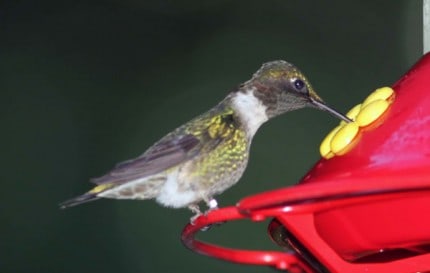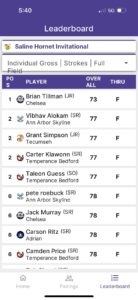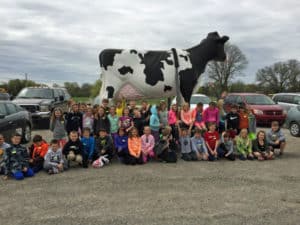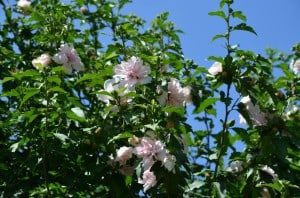
(Chelsea Update would like to thank Jennifer Fairfield for the information in this column. Part one ran yesterday.)
If you’re hoping to grow flowers, and haven’t gotten those seeds or plants in the ground yet, don’t wait much longer. If you’re putting in plants, don’t forget to mulch around them when you plant. Mulch is just about the most important thing you can do for your plants – it helps keep moisture in, maintains moderate soil temperatures, and keeps weeds down.
If planting seeds, mulch as soon as the plants are big enough not to get crushed by the mulch, and keep them well-watered in the meantime. Of course, Mother Nature seems to be doing a great job of keeping things watered, without our help, so far – but that could change at any moment, so keep an eye on the weather, and water whenever Mother Nature isn’t providing at least an inch per week. Invest in a good rain gauge to help you keep track of the amount of rain we get – it helps take the guesswork out of the whole watering thing.
Be sure to pay extra attention to anything you have just planted (or are going to plant) this spring. Newly planted trees, shrubs, and perennials need to be well-watered as they are getting established. They aren’t as good at taking up water from the soil as plants that have been there for one or more years, so you need to make sure that you are keeping the soil properly hydrated. If we continue to get the kind of rain we have been, that shouldn’t be a problem, but you just can’t count on Mother Nature being cooperative, so stay vigilant.
Water your container plants regularly – especially any that are under porches or eaves (like window boxes), since they often don’t get the benefit of the rain. Soil in containers dries out much more quickly than in the ground, even more so if the containers are in the sun and exposed to the wind. Don’t forget that plants in containers need to be fertilized on a regular basis, mostly because you will be flushing out what fertilizer is in the soil with all the water you are giving them. Just be careful not to fertilize more than is suggested on the label of the product you are using – chemical fertilizers can cause “burn” on your plants when over-applied. Fertilizer burn happens because most chemical fertilizers contain salts, which draw the moisture out of your plants. Slow-release and organic fertilizers can help to prevent fertilizer burn.
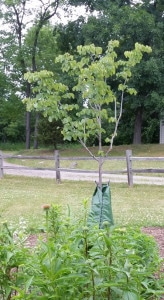
Speaking of containers, indoor plants can benefit from spending the summer outdoors, but be sure to place them in a spot where they will be protected from winds and where they will get some filtered sun throughout the day. Houseplants are not used to the direct sun, and can be easily scorched if they are not given a little shade. They will also dry out more quickly outdoors than in, so be sure to increase your watering schedule. And don’t forget to fertilize them.
Are you planning to do some planting of trees, shrubs, and perennials yet this year? June can be a good month to do that, especially if you or Mother Nature are sure to keep them well-watered. If you are looking for some ideas of what to plant, consider planting natives that will attract bees, butterflies, and other beneficials. Over the last couple of years, I’ve been working on removing some of my lawn and replacing it with native flowers, grasses, and trees. I have a couple of reasons for doing this, but the biggest one is to cut down on the amount of time and effort that goes into keeping up the perfect lawn, not to mention the cost of fuel, fertilizers, and pesticides. Some statistics that are a little mind-boggling to me about lawn upkeep are:
Americans spend more than $40 billion on lawn care every year.
- 9 billion gallons of water are used, every day, in the US, just to take care of residential lawns.
- Americans use 90 million pounds of fertilizer and 78 million pounds of pesticides on lawns every year.
- 17 million gallons of gas are spilled every year in the US, in the process of refueling lawn equipment.
My other reason for converting lawn to gardens is to help the bees, butterflies, and other beneficial insects. We are losing our honey bees at an alarming rate – though last year’s rate of loss was a little lower than the last few in Michigan, honey bee keepers still lost around 20% of their bees.
Monarch and other butterfly species are also declining. We can help to slow that process down, though. One way is by planting native plants that provide sources of food for larvae and adults. Some of the best plants native to Michigan for bees and butterflies include penstemon, coneflower, asters, and milkweed., The MSU Extension has a great brochure for plants to attract bees and other beneficial insects, and the Michigan DNR offers this table as a reference for plants to consider for butterfly gardens and to attract hummingbirds.
For the Birds
I’ve had a number of people tell me they haven’t been seeing as many Baltimore orioles or hummingbirds at their feeders this year, and they can’t figure out why. I have seen them at my feeders, though they were later arriving than usual, but only by a few days. I had the opportunity to speak with one of our local experts, who told me that large numbers of our hummingbirds were delayed by storms, but they have been starting to show up more and more in the last couple of weeks, so don’t despair.
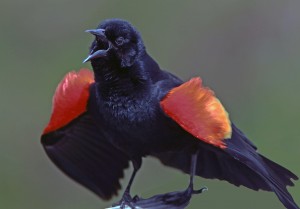
Keep your feeders clean and full (change the nectar at least once per week at this time of year, and more frequently as the temperatures go up). One thing to keep in mind – all the rain we’ve been getting could be diluting the nectar in your feeders, making it less attractive to the birds, so you might want to refill your feeders after a good rain.
Water is just as important to your backyard birds as it is to your plants. Birds need good sources of clean water for drinking and bathing, and even if we have been getting a lot of rain, it doesn’t mean that there is always a water source nearby for the birds. If you don’t already have one, consider putting out a birdbath for your feathered friends.
If you have one, make sure you keep it cleaned out and filled with water. Replacing the water every day will be as beneficial to you as the birds – it helps keep mosquitoes from laying their eggs in the water. Another option is to keep the water moving. Birds love moving water, and mosquitoes don’t! Adding a fountain or “water wiggler” to the birdbath will make your birds happy and help to reduce the number of mosquitoes.
At this time of year, birds are busy raising their young. While you are out in your yard and garden, keep an eye out for baby birds so that you don’t inadvertently harm them. Whether or not you should do anything to help a baby bird you find in your yard depends on a number of things.
Happy Gardening!
